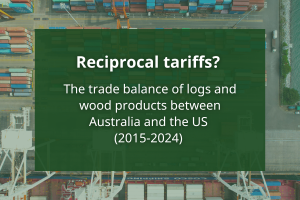Australia’s woodchip exports were up 1.1% over the year-ended August, totalling 7.495 million bone dried metric tonnes (bdmt). Annualised woodchip exports are below their peak, reached in December 2017, but are just 1.3% off that level, underscore the strength of markets.
Hardwood chip exports continue to dominate, rising 5.1% over the prior year, to 6.747 million bdmt. As the chart below shows, softwood chip exports were softer, falling 4.1% over the year-ended August, but noting that is a negligible, approximately 28,000 bdmt lower than a year earlier.

To go straight to the dashboard and take a closer look at the data, click here.
Also barely indicated on the chart above, wood pellet exports, shown in green, continue to rise, and over the year-ended August, totalled 97,497 tonnes.
The second chart shows Australia’s hardwood chip exports, by country of destination, since the beginning of 2009. It charts the history of a trade that has matured into the sophisticated and reliable arrangements the nation’s ports observe literally every month.
From the ‘Japan only’ days of a decade ago, to the decline brought about by a near parity Australian dollar, through to mid-2013, to the subsequent rise, driven almost entirely by Chinese demand growth, from 2014 through to late 2017 and the subsequent plateau brought about by the Australian supply-chain reaching its nominal peak of capacity.

To go straight to the dashboard and take a closer look at the data, click here.
It is clear that the Australian export story for hardwood chips, is also a China story.
For the year-ended August 2009, Australia’s shipments to China accounted for 12.3% of the total and were just below 500,000 bdmt. Almost a decade on and over the year-ended August 2018, exports to China totalled 4.206 million bdmt, and accounted for 62.3% of total shipments over the period.
It is true, and the chart demonstrates this, that shipments to Japan have returned to some growth over the last year. They rose 11.5% to 2.177 million bdmt, whereas exports to China rose just 2.7% over the same period.
China has become fundamental to the Australian hardwood chip trade, but as this data shows, one should never forget original friends. Without the Japanese demand, it is unlikely Australia would have a hardwood chip trade at all.



